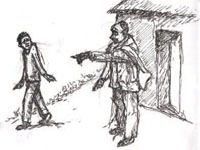Changes in thinking and reasoning (cognition)
Children tend to be concrete thinkers, mostly relying on literal, straightforward interpretation of ideas. In adolescence they become abstract thinkers, as they begin to be able to think abstractly and to conceptualise abstract ideas such as love, justice, fairness, truth and spirituality.
They start to analyse situations logically in terms of cause and effect, think about their futures, evaluate alternatives, set personal goals and make mature decisions.
As their abilities to think and reason increase, adolescents will become increasingly independent, and take on increased responsibilities. They will also often challenge the ideas of the adults in their community and this can lead to friction (see Figure 1.2).

Figure 1.2 Son disobeying his father's commands.
Last modified: Friday, 20 June 2014, 11:21 PM